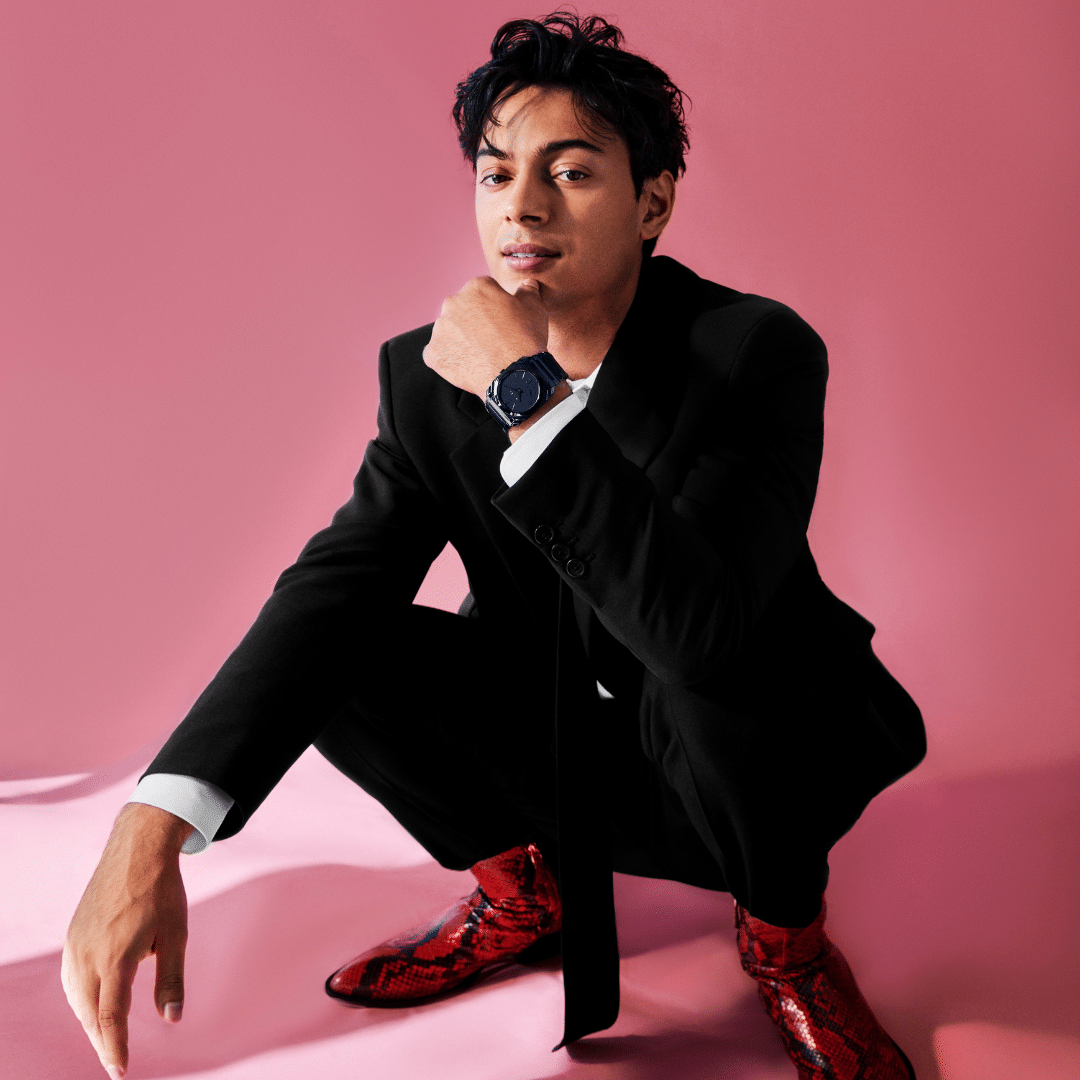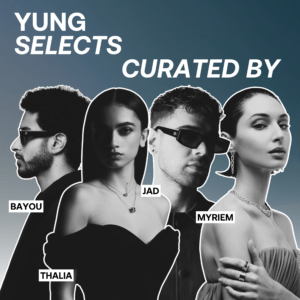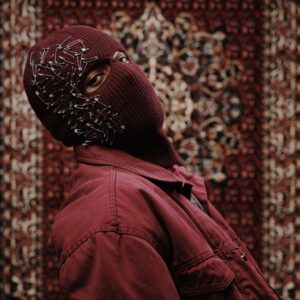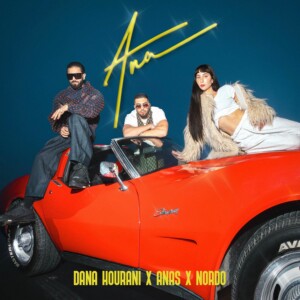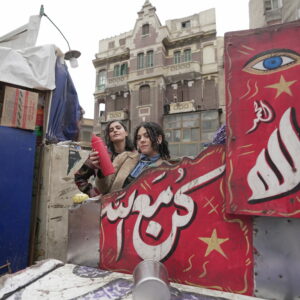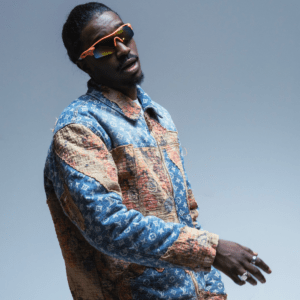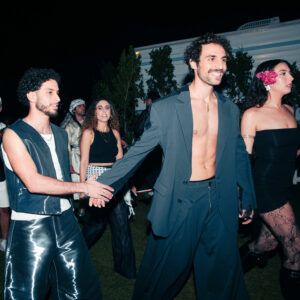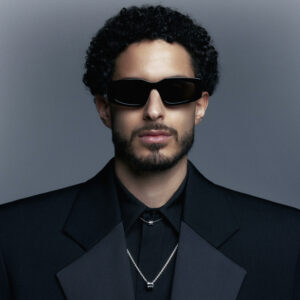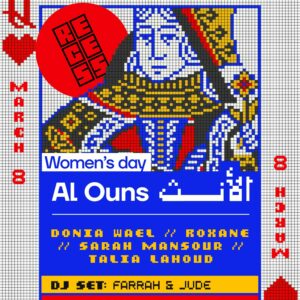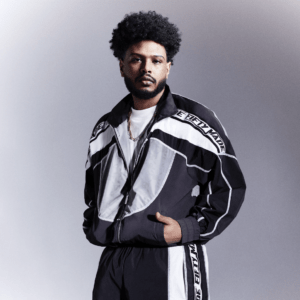200,000,000 streams and counting, it’s safe to say that ‘Can’t Love Myself’ by Mishaal Tamer (Instagram) is something of a viral sensation. Recorded in a dorm room, dimly lit, its protagonist clad in a hoodie, it’s been sampled by artists from around the world, America, Russia, Germany. It’s the perfect example of the appeal of a young man from Saudi, the power of his vocals and an international audience that’s crying out for something new, something fresh. Mishaal Tamer and his low-fi, contemporary sound have struck a chord.
Mishaal, he says, would probably never have picked up an instrument but for a twist of fate when he was young. At around nine years old, he had an accident on a bouncy castle, “At first they were going to get rid of my arm. But luckily a doctor who had studied in Germany, he performed a surgery, fixed the arm, but the nerves were destroyed, my fingers and wrist weren’t working properly,” a disaster, a trauma, but one that would shape the rest of his life. “He suggested that I learn the guitar, because I’d have to use my left arm to play. I got a little plastic Yamaha, it’s in one of my videos. I learned A minor, F minor and G major,” he says. The surgery’s legacy goes further than a plastic guitar, Mishaal smiles as he says, “If you listen to my melodies, they’re simple, I can’t play something super complicated. So, I focused on making little melodies, super catchy.”

So, how do you go from a plastic guitar to over 200 million streams and soaring international fame? As a result of his Yamaha-powered physiotherapy, Mishaal spent hours playing music. “I can’t remember if I liked it in the beginning, but I pushed through, something about it came through,” he says. The realization that music, chords, could be sad or happy, and could often communicate more effectively than words hit him, and appealed as “a true communicator of emotions”.
In middle school, at 12 years old, Mishaal was writing music and formed a band, the first band at his school, he says. A career in music wasn’t on the cards, it became a running family joke, Mishaal laughs as he happily remembers his father telling him to focus on his studies. The family was never judgmental, but he remembers people around him telling him to stop playing, that it was haram. Luckily, it seems all of this just made him more determined.
A move to a boarding school at 14 was eye-opening. “It was all classical music, nothing contemporary,” says Mishaal, “I knew that if they [the students] could express themselves, that they’d love it.” There was no contemporary music program, he’d build it, he decided, “I made the program when I was 15 or 16. I also did Computer Science, I was OK, but I hated it. I wrote code, it helped me with song writing, the structure, it’s a similar idea, especially if it’s clean code, simple is best.” Music was all around him, all the time. One song, written during an exam and later recorded on an Xbox microphone, exploded online, he says.


University was calling, “Senior year comes up and I apply to two schools. I found Clive Davis, the [music] school. My parents were like, “How are you going to get a job?” This was 2017, and Saudi hadn’t opened up. It was a Hail Mary, that’s how I thought of it. I didn’t think they’d say ‘Yeah’. I also studied really hard for Carnegie Melon, for Computer Science.” Both schools accepted him. Somehow Mishaal forgot to tell his parents about his acceptance to the Computer Science course.
As with many long suffering fathers, Mishaal’s agreed to let him move to New York, perhaps despite his better judgement. They made a deal, Mishaal would take on a triple major, but he’d be able to study at Clive Davis. It was then when things started to happen. “That’s when I started uploading. I did the first song, “Can’t Love Myself” when I was really down in my dorm. I’m only wearing a hoodie, the lights are down, I just recorded it. People started sampling it. I found it later, two weeks later, on YouTube. People from America, Russia, Germany started using it. With its samples, it’s got 200,000,000 streams on Spotify now,” he says, the amazement still clear in his voice.
If music has long been a major influence in his life, so too has gaming. GTA and World of Warcraft were the games of the time and Mishaal’s gamer tag was the same as that he’d uploaded Can’t Love Myself under. One day, Monty Datta, a producer, found him, “The guy asked me if I was the same guy from the song and it went from there. I joined a couple of Discord servers with producers. We made ‘Addicted’. The emotions were there, it was all true, that’s all that matters, I never wrote a song from anyone else,” he says.

It all began to snowball, and even his professors at Clive Davis were advising him to take a year off to focus on his music. Then dad stepped in again. Mishaal laughs, “He told me that I’d have to sign to a record label [if he was going to take a year off]. That seemed impossible. But, I had to sign with a major record label, Sony, Warner Music or Universal.”
“How do I do that?” he says.
Exactly. Well, this is the point in the story where it goes from pretty cool to downright unbelievable, but it happened. “I go back home to Saudi. My cousin, Sultan, was with me in NYC, studying film, and we have this idea. Near my home was a creepy abandoned house and he took a camera from school and we used iPhone flashlights to light the video, ‘Arabian Knights’. This was the first time you saw my face, the first time as an artist. Lo and behold, some people from the US saw it and the labels started reaching out. Not just indies, the major ones,” he says.
“The major ones.” By that he means Columbia Records, Epic and RCA. No big deal. Now, Mishaal can speak English, Spanish – his mother’s from Ecuador – and Arabic, he’s a good-looking man and he can carry a tune, a bidding war ensued. “My first A&R [artist and repertoire] meeting was in a restaurant with the CEO of Columbia Records from the UK, and Epic Records from the US, my manager – who I still work with today – was like “What the fuck?”,” he says. Mishaal ended up going with RCA Records in the US. Elvis had been with RCA and the name brought back fond memories from when he was a kid. A few months had passed since his dad’s ultimatum. He had made it. Or at least taken the first step.


A demo EP came out through Sony and Mishaal struggled with the idea that he was out there, his face, not just his name. “Before that, no-one associated my songs with me. But, with Sony’s help, we released my songs, including the one recorded on the Xbox mic. What really struck me was that people were getting into it, outside Saudi, but also inside. People would champion me!” he says. He pauses for a second, “Cinemas weren’t even open.”
It seems remarkable, but Mishaal’s plans have evolved already, “We came up with the idea of the Arabian Knights record label. It’s become a long term thing, we’ve partnered with Empire Records. We’ve just started, I’ve been working on it for two years, it’s called ‘Home is Changing’,” he says. His most popular online clips are going to be made into full songs in a five-chapter long debut with each chapter as an EP, each with five songs.
“It starts at rock bottom, I was sad in the US, and COVID. Chapter 2 is ‘The Love’, when I fell in love with this girl. I thought it would get me out of Chapter 1, The Deep. Chapter 3 is bam, the breakup, the heartbreak. It’s a really personal project and I don’t think that’s been done. Chapter 4 is The Dream, it’s about my recurring dream of wanting to go back home, the days melded in months, years, and this was during COVID, it was a weird time for everyone. It opened a lot of our eyes to self-reflection. That’s what this journey is all about,” he says. The final Chapter, The Return, refers to both his return home and his return to his “inner child”, a version of himself that he lost, “The journey isn’t just about Saudi changing, it’s much more than that, home is Mishaal, me, us, we’re changing.”
What people take from Home is Changing is entirely up to them, he says, “A lot of my songs, they’re written for me, but once I put it out there, it’s for you. Make it what you need. It allows us to talk about our feelings, and to connect with other fans, to open up, to connect.”
Beyond Home is Changing, Mishaal has plans, bold plans, he’s looking to create a sound, a musical movement perhaps, “I want to create S-Pop, Saudi Pop,” he says. “I want to find a local sound, from our home, our heritage, and the things we’ve been inspired by as young people. It’ll be based on what we love, who we are. We’ll make something new, give it to the world. It’s art, it’s not just oil, we have artists, creative youth, we’re changing. I want to show that through music.”
There’s a lot of music coming out of MENA at the moment, or rather, MENA music is getting a lot more press than ever before, both here and abroad, and Mishaal’s all for it, “I think it’s beautiful, I think it’s time for people to stop seeing Arabs as the bad guys, we need a new perspective.” But, he’s quick to add, “That scene is mostly coming out of the Levant and Canada. But there’s so much going on in Saudi. Boxing matches, Ronaldo, F1. Saudi Arabia is completely different. You needed an invitation to enter Saudi before. It’s different. I’m Saudi, I’m not from Jordan or Egypt. There’s no road for me to run on, we’ve got to make one,” he says.
Then he pauses again, “I want to create a road so all these young kids can run.”
Music aside, or perhaps music-adjacent, Mishaal is also going to feature on the silver screen, he’s involved in an upcoming project, “It’s called ‘My Driver and I’. It was made by a female director, DOP [director of photography], and producer, and a female lead as well, it’s very new. I’m so excited about the movie. My character, once I did the rehearsals, the director put a bit of my story into the movie, and there’s a song I wrote for the movie, an English-Arabic acoustic S-Pop thing,” he says with a grin.

Alongside his passion for music and his upcoming film, fashion has always played a role in Mishaal’s life, a means of experimentation and discovery, an avenue of self-expression, “I think if we let it, fashion can be an integral part of the human experience,” he says. Mishaal recently took part in Bvlgari’s ‘Wonders of Love’ campaign for Ramadan, where he spoke of his earliest memories of the holy month and helped to introduce the brand’s latest pieces.
Funnily enough, his family’s connection to the brand goes back a generation; his father’s family gave his mother a diamond when she married, “We actually took it to Bvlgari in Milano, 1994. So it was them, it was Bvlgari who placed the stone in the ring!”, she told Mishaal, “My mother loved the design, thankfully she loved my father, too!” he says with a laugh. “Shooting the [Bvlgari] campaign in Wadi-Rum was surreal; the location felt out of this world and the people involved made me feel right at home. It’s also an incredible honour to have had the opportunity to be there and be a part of it,” he said.
The rapid growth and diversity of the various music scenes across MENA is astounding, and while Mishaal is entirely right, Saudi is different, and it’s changing fast, it’s exciting to think how S-Pop might fit into the overall picture. A unique, youthful sound for a country undergoing sweeping changes, it all seems to fit, the right idea, in the right place at the right time, there’s no telling where the road will end.
For more stories like this with Mishaal Tamer, follow our dedicated Music pages.
